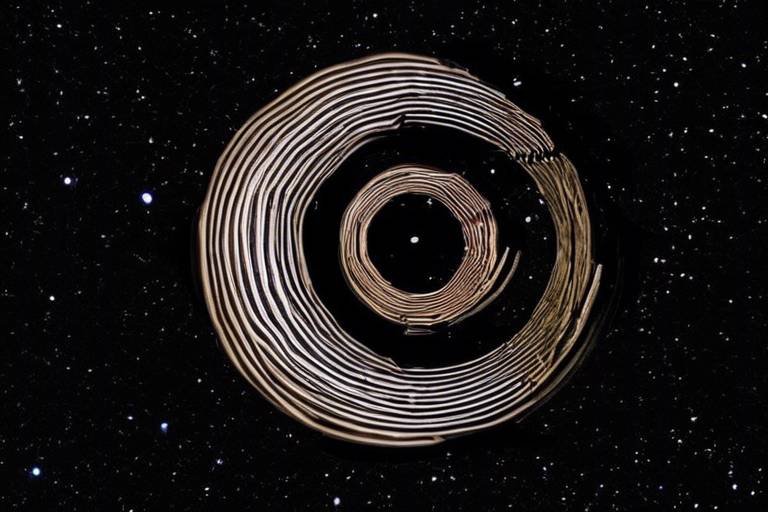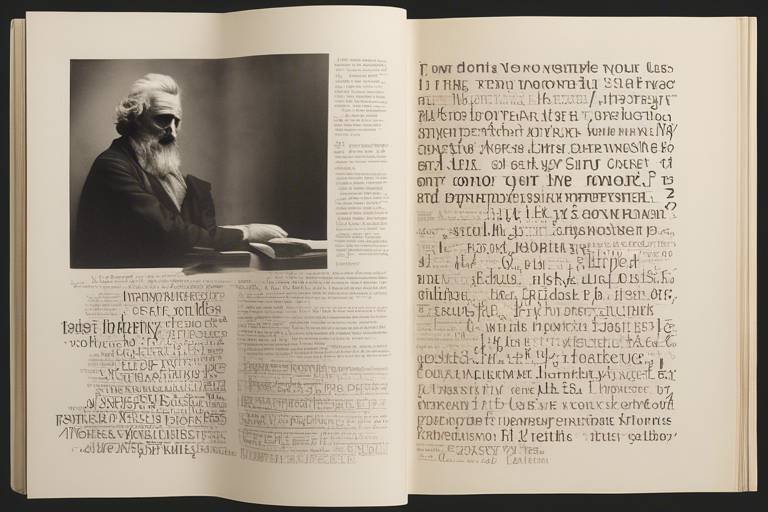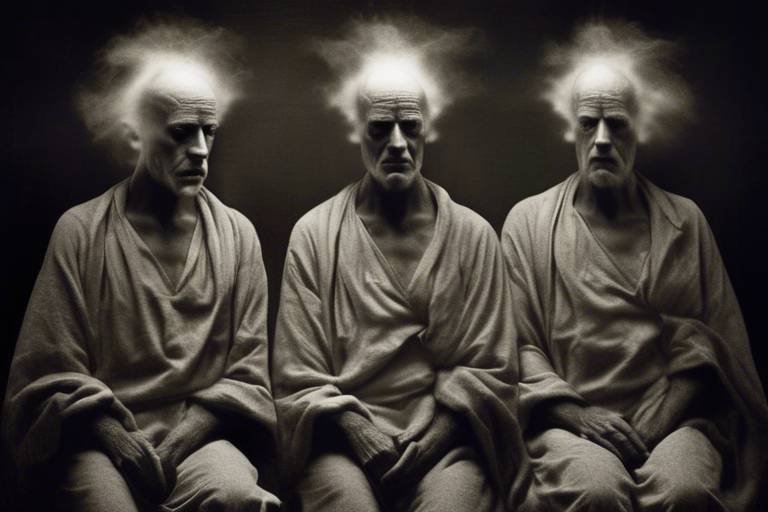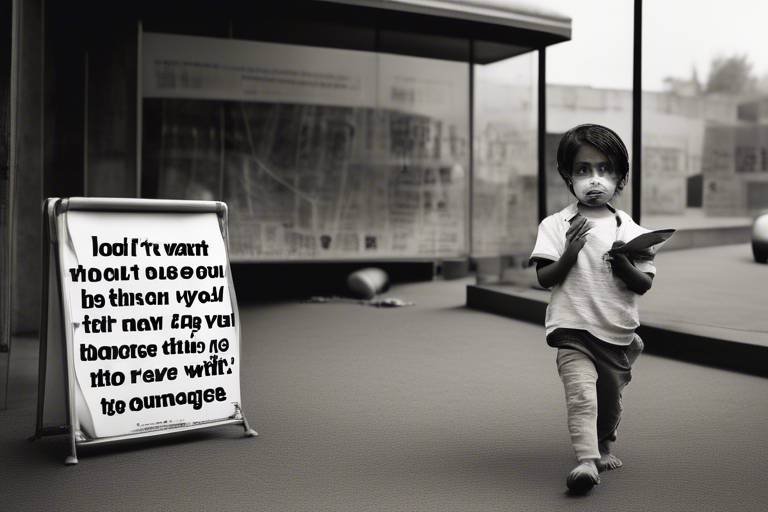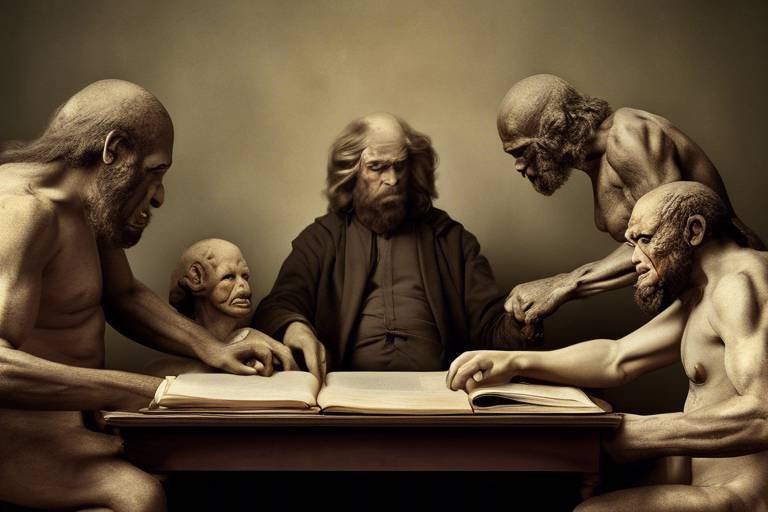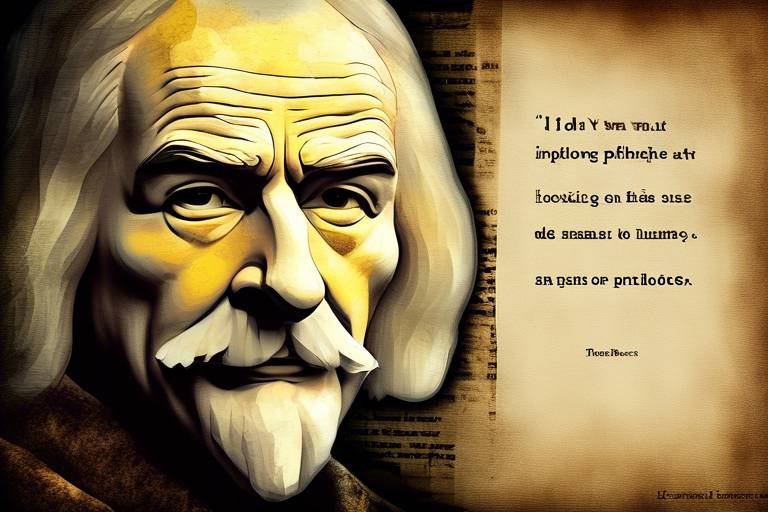Understanding the Philosophy of Space and Time
This article delves into the intricate relationship between space and time, exploring various philosophical perspectives and implications that shape our understanding of the universe. It's a fascinating journey that intertwines the realms of science and philosophy, inviting us to ponder the very fabric of reality. Have you ever wondered how the universe operates beyond our everyday experiences? How do we perceive the vastness around us and the flow of moments in our lives? These questions are not just for scientists; they are for anyone curious about existence itself.
When we think about space, we often visualize a vast, empty expanse filled with stars and planets. But philosophically, space is much more than that. It's a complex entity that influences our perception of reality. Philosophers have debated whether space is an independent entity or merely a relational concept, defined by the objects within it. For instance, is space something that exists on its own, or does it only come into being when there are objects to occupy it? This question leads us to explore various interpretations of space, including:
- Absolute Space: The idea that space exists independently of the objects it contains.
- Relational Space: The belief that space is defined by the relationships between objects.
- Dimensionality: How many dimensions does space have? Is it just three, or could there be more?
Understanding these interpretations helps us grasp how space influences not just our physical world but also our mental constructs. It shapes our experiences, our movements, and even our thoughts. Imagine space as a canvas, where every star, planet, and atom is a brushstroke contributing to the masterpiece of the universe.
Now, let's shift our focus to time. Time is often perceived as a linear progression—from the past, through the present, and into the future. But is it really that straightforward? Philosophically, time can be viewed in two primary ways: linear and cyclical. Linear time suggests a one-way street, where events unfold in a sequential manner, while cyclical time implies that events may repeat in a loop, reminiscent of the seasons or life cycles.
Our perception of time can vary dramatically based on psychological and cultural factors. For instance, have you ever noticed how time seems to fly when you’re having fun but drags on during dull moments? This subjective experience of time is influenced by various factors, including:
- Age: As we grow older, time often feels like it speeds up.
- Culture: Different cultures have unique perspectives on time, shaping how individuals experience it.
- Activities: Engaging in stimulating activities can alter our perception of time.
This variability raises intriguing questions about the nature of time itself. Is it a constant force, or can it be bent and shaped by our experiences and perceptions?
Several significant philosophical theories attempt to explain the nature of time. These include:
| Theory | Description |
|---|---|
| Presentism | The belief that only the present moment is real; the past and future are mere abstractions. |
| Eternalism | The view that all points in time are equally real, suggesting that past, present, and future exist simultaneously. |
| Growing Block Theory | The idea that the past and present are real, but the future is yet to come into existence. |
These theories not only shape our understanding of time but also have profound implications for how we view existence itself.
Time is intricately linked to causality, the principle that every effect has a cause. This relationship is essential for understanding how events unfold in the universe. Imagine a line of dominoes; when one falls, it triggers the next, illustrating the flow of time and causation. Philosophically, this raises questions about determinism versus free will. Are our actions predetermined by past events, or do we have the freedom to shape our future?
Now, let’s bring space and time together. The concept of the space-time continuum integrates ideas from both physics and philosophy, suggesting that space and time are not separate entities but rather interwoven aspects of reality. This perspective revolutionized our understanding of the universe, particularly through Einstein's theories. Just as a fabric can stretch and warp, so too can the fabric of space-time be influenced by mass and energy.
The interplay between space and time leads us to broader philosophical implications. If space and time are interconnected, what does that mean for our understanding of reality and existence? Are we merely fleeting moments in a vast cosmos, or is our existence part of a larger, timeless narrative?
These inquiries bring us to profound existential questions. What is our place in the universe? How do we find meaning in a reality defined by the vastness of space and the flow of time? These questions challenge us to rethink our existence and our connection to the cosmos.
Finally, it’s essential to recognize how philosophical perspectives on space and time have influenced scientific thought. The dialogue between philosophy and science has led to groundbreaking discoveries, reshaping our understanding of the universe. As we continue to explore these concepts, we realize that philosophy is not just an abstract discipline but a vital part of scientific inquiry.
- What is the difference between space and time? Space refers to the three-dimensional expanse in which objects exist, while time is the progression of events from the past to the future.
- How do philosophers view the nature of time? Philosophers have various interpretations of time, including presentism, eternalism, and the growing block theory.
- Can time be perceived differently? Yes, our perception of time can vary based on psychological factors, cultural backgrounds, and our current activities.

The Nature of Space
Space is a concept that has fascinated philosophers, scientists, and thinkers for centuries. It is often described as a vast, empty expanse, yet its nature is anything but simple. When we think about space, we might picture the infinite cosmos, filled with stars and galaxies, or perhaps the more familiar surroundings of our own planet. But what does it really mean to exist in space? How does it shape our reality? These questions delve into the very essence of our understanding of the universe.
Philosophically, space can be viewed through various lenses. One perspective is that space is a container for objects, a stage where events unfold. In this view, space is passive, merely existing to hold things. Alternatively, some argue that space is an active participant in the unfolding of reality. It influences how we perceive distances, relationships, and even the flow of time. This duality raises intriguing questions about the properties of space itself. Is it infinite? Does it have boundaries? And if so, what lies beyond those boundaries?
Another important aspect of space is its dimensions. We live in a three-dimensional world, where we can move up and down, left and right, and forward and backward. But what about the fourth dimension, often referred to as time? This fusion of space and time creates a complex tapestry that defines our existence. The concept of dimensions challenges our understanding and invites us to consider how we navigate through life. For instance, when we talk about the distance between two points, we are not just measuring physical space; we are also acknowledging the time it takes to traverse that distance.
In addition to its dimensional properties, space also influences our perception of reality. Our experiences are deeply rooted in our spatial awareness. For example, think about how a crowded room can feel overwhelming, while an open field can evoke a sense of freedom. This interplay between space and emotion highlights the significance of our environment in shaping our thoughts and feelings. It’s almost as if space has a personality of its own, affecting our mood and actions in subtle yet profound ways.
Moreover, the nature of space is not just a philosophical inquiry; it has practical implications as well. In modern physics, concepts like curved space and quantum entanglement challenge our traditional notions of space. The idea that space can bend and warp under the influence of mass fundamentally alters our understanding of the universe. For instance, the famous equation Emc² illustrates the relationship between energy, mass, and the fabric of space itself. This interplay between space and physics invites us to reconsider everything we thought we knew about our surroundings.
Ultimately, the nature of space is a rich tapestry woven with philosophical musings, scientific inquiry, and personal experience. It invites us to explore the unknown and question the very fabric of our existence. As we continue to unravel the mysteries of space, we find ourselves on a journey that not only expands our understanding of the universe but also enriches our experience of life itself.
- What is the philosophical definition of space? Space is often viewed as a container for objects and events, influencing our perception of reality and existence.
- How does space affect our emotions? The environment shaped by space can evoke various feelings, influencing our mood and actions.
- What are the implications of curved space in physics? Curved space challenges traditional notions of distance and gravity, fundamentally altering our understanding of the universe.
- Is space infinite or finite? The nature of space remains a topic of debate among philosophers and scientists, with no definitive answer yet.

The Concept of Time
The concept of time is a fascinating and often perplexing subject that has intrigued philosophers, scientists, and thinkers throughout history. At its core, time is what allows us to make sense of our experiences, to understand the sequence of events, and to navigate through life. But what exactly is time? Is it merely a measurement of change, or does it hold deeper philosophical significance? To grasp the essence of time, we must explore its nature, its flow, and its impact on our existence.
Philosophically, time can be viewed in several ways. One perspective considers time as linear, suggesting that it moves in a straight path from the past, through the present, and into the future. This viewpoint aligns with our common experience—each moment leads to the next, and we often think of life as a series of events unfolding one after another. However, there’s another perspective that challenges this notion: the cyclical view of time, which posits that time is more like a circle, repeating itself in cycles. This idea is prevalent in many cultures, particularly in Eastern philosophies, where the concept of reincarnation and the seasons reflect a return to previous states.
Moreover, our perception of time is not just a straightforward experience; it is also influenced by various psychological and cultural factors. For instance, have you ever noticed how time seems to fly when you're having fun but drags on during a boring lecture? This phenomenon is known as temporal perception, and it reveals how subjective our experience of time can be. Different cultures also perceive time differently; some may view punctuality as essential, while others embrace a more relaxed approach to timekeeping. Such variations highlight that time is not just a universal constant but a construct shaped by human experience.
When we delve deeper into temporal perception, we uncover a rich tapestry of psychological aspects that influence how we experience time. Factors such as age, emotional state, and even cultural background can significantly alter our perception. For example, children often perceive time as moving slowly, filled with endless possibilities, while adults may feel as though time accelerates as they age. This discrepancy raises intriguing questions: what does it mean for our understanding of life when our perception of time can change so drastically?
Several significant philosophical theories attempt to explain the nature of time, each offering unique insights into its implications for existence. Here are a few notable theories:
- Presentism: This theory posits that only the present moment is real, and the past and future are merely illusions. According to presentists, our focus should be solely on the here and now.
- Eternalism: In contrast to presentism, eternalism suggests that all points in time—past, present, and future—are equally real. This view implies that time is like a landscape, where every moment exists simultaneously.
- Growing Block Theory: This theory combines elements of both presentism and eternalism, suggesting that the past and present are real, but the future is not yet determined. As time progresses, the "block" of reality grows, incorporating new moments into existence.
Each of these theories carries profound implications for how we understand our existence and the universe. For instance, if presentism is true, it emphasizes the importance of living in the moment, while eternalism might suggest that our actions are part of a larger tapestry that transcends our immediate experience.
The relationship between time and causality is another crucial element in the philosophical discourse surrounding time. Causality refers to the principle that every effect has a cause, and this principle is deeply intertwined with our understanding of time. Events are ordered in time, and this ordering is essential for making sense of our experiences. For example, if you drop a glass, it shatters on the floor, and this sequence of events is crucial for understanding the relationship between your action and the outcome. Philosophers have long debated whether causality is a fundamental aspect of time or merely a construct of human perception.
In conclusion, the concept of time is a multifaceted and complex subject that invites us to ponder our existence, our experiences, and the very fabric of reality. As we navigate through life, our understanding of time shapes our decisions, influences our emotions, and ultimately defines our human experience. Whether we perceive time as linear or cyclical, the philosophical exploration of time continues to challenge and inspire us, prompting us to question our place in the cosmos.
- What is the difference between linear and cyclical time? Linear time suggests a straightforward progression from past to future, while cyclical time implies a repetitive nature, often associated with natural cycles.
- How does culture influence our perception of time? Different cultures have varying attitudes towards time, affecting how punctuality, scheduling, and the flow of events are perceived.
- What are the main philosophical theories of time? The main theories include presentism, eternalism, and the growing block theory, each offering distinct perspectives on the nature of time.

Temporal Perception
When we think about time, it often feels like a river flowing steadily, carrying us from the past into the future. But what if I told you that our perception of this flow is as fluid as the water itself? is the way we experience and interpret the passage of time, and it can be influenced by a myriad of factors—psychological, cultural, and even biological. Have you ever noticed how time seems to fly when you're having fun yet drags on during a boring lecture? This phenomenon is not just a trick of the mind; it’s a fascinating interplay of our cognitive processes and environmental stimuli.
To better understand this, let’s dive into some of the key aspects that shape our temporal perception:
- Psychological Factors: Our emotions and mental states can significantly affect how we perceive time. When we’re anxious or stressed, time seems to slow down, while moments of joy can make it feel like it’s speeding by.
- Cultural Influences: Different cultures have unique attitudes toward time. For example, some cultures view time as linear, emphasizing schedules and punctuality, while others adopt a more cyclical perspective, focusing on natural rhythms and seasons.
- Biological Rhythms: Our bodies are governed by biological clocks that regulate our sleep-wake cycles and other physiological processes, which also play a role in how we perceive time.
Interestingly, research has shown that our perception of time can even be altered by external factors like age. Children often experience time more slowly than adults, which might explain why a summer vacation feels like an eternity to a ten-year-old but seems to whiz by for a thirty-something. This difference can be attributed to the way we process new experiences; children encounter many new things, making time feel more expansive, while adults often fall into routines that compress their experiences.
Furthermore, the concept of time dilation from Einstein's theory of relativity introduces another layer of complexity. According to this theory, time can actually pass at different rates depending on your speed and gravitational field. For instance, astronauts aboard the International Space Station experience time slightly differently than those of us on Earth—how mind-boggling is that? This scientific perspective adds depth to our understanding of temporal perception, suggesting that time is not just a constant but a variable influenced by our surroundings and experiences.
As we ponder the intricacies of temporal perception, it becomes evident that our understanding of time is not merely a straightforward measurement but a rich tapestry woven from our psychological, cultural, and biological threads. This complexity invites us to reflect on our own experiences and how they shape our understanding of existence itself.
- What is temporal perception? Temporal perception refers to the subjective experience of time, including how we sense its passage and how it can vary based on various factors.
- How do emotions affect our perception of time? Emotions can significantly alter our experience of time; for example, anxiety may make time feel slower, while happiness can make it feel faster.
- Does culture influence how we perceive time? Yes, different cultures have distinct views on time, which can shape behaviors, attitudes, and even daily activities.
- Can our age affect how we perceive time? Absolutely! Children often perceive time as slower compared to adults due to their frequent new experiences.

Philosophical Theories of Time
When we dive into the , we uncover a rich tapestry of ideas that challenge our everyday understanding of this elusive concept. Time is often perceived as a straightforward progression from past to present to future, but philosophers have long debated its true nature. One of the most prominent theories is presentism, which posits that only the present moment is real. According to this view, the past is merely a memory, and the future is an anticipation—nothing more than potentiality. Imagine time as a flowing river, where only the water currently under your feet is tangible, while the rest is just a reflection of what was and what could be.
In contrast, we have eternalism, which suggests that all points in time—past, present, and future—are equally real. This theory paints a picture of time as a vast landscape, where every moment exists simultaneously, like a movie reel laid out flat. You can think of it as a book where every page is already written; it’s just a matter of flipping through to experience different parts of the story. Eternalism challenges our perception of change, suggesting that events are fixed within the fabric of time, and our experience of them is merely a journey through this predetermined narrative.
Another fascinating perspective is the growing block theory. This theory posits that the past and present are real, but the future is not yet actualized. Picture a block of clay that grows as new moments are added, with the past being solid and unchangeable, while the future remains malleable and undefined. This theory captures the essence of human experience, where we continuously shape our future through decisions made in the present, while also acknowledging the weight of our past. It emphasizes a dynamic interaction between moments, suggesting that while the future is uncertain, it is also a canvas for our actions.
These theories not only influence our understanding of time but also have profound implications for our existence. They raise questions about free will, determinism, and the nature of reality itself. For instance, if eternalism is true, are our choices merely illusions in a pre-scripted universe? Conversely, if presentism holds, what does that say about our memories and the way we perceive our lives? Each theory invites us to ponder our place within the cosmos and the very essence of what it means to exist.
As we navigate through these philosophies, it’s essential to consider how they intertwine with our daily lives. The way we experience time can vary dramatically based on cultural perspectives, psychological states, and even technological advancements. For example, in some cultures, time is viewed as cyclical, emphasizing the repetition of seasons and events, while others see it as linear, focusing on progress and development. This diversity in perception can lead to differing approaches to life, work, and relationships, illustrating how deeply intertwined our understanding of time is with our overall worldview.
In summary, the philosophical theories of time invite us to explore not only the mechanics of time itself but also how these concepts shape our understanding of existence. Whether we lean towards presentism, eternalism, or the growing block theory, each perspective offers a unique lens through which to view the universe and our place within it. As we continue to ponder these theories, we open ourselves to a deeper appreciation of time's complexity and its profound impact on our lives.

Time and Causality
The relationship between time and causality is a fundamental concept that has intrigued philosophers and scientists alike. At its core, causality refers to the principle that an event (the cause) leads to another event (the effect). But how does this interplay with our understanding of time? To grasp this, we must consider how we perceive events unfolding in a temporal sequence. Imagine watching a movie; the plot progresses in a linear fashion, where one scene leads to another. Similarly, in our reality, events are ordered in time, and this ordering is essential for us to make sense of the world around us.
Philosophically, the question arises: Does time itself dictate causality, or are we imposing a temporal framework onto our understanding of causal relationships? Some argue that causality is a fundamental aspect of the universe, existing independently of time, while others claim that without time, the notion of cause and effect becomes meaningless. This debate leads us to consider various philosophical theories that explore the nuances of time and causality.
One of the most prominent theories in this realm is called causal determinism, which posits that every event is determined by preceding events in a causal chain. This theory suggests that if we knew all the initial conditions of the universe and the laws of nature, we could predict every future event. In this view, time acts as a backdrop against which the unfolding of events occurs, reinforcing the idea that causality is deeply intertwined with the flow of time.
However, the relationship is not always straightforward. There are instances where the ordering of events seems to defy our traditional understanding of causality. For example, consider the phenomenon of quantum entanglement, where particles can be instantaneously connected regardless of the distance separating them. This challenges the conventional notion of cause and effect, as it suggests that events can be correlated without a clear temporal sequence. Such instances provoke profound questions: Can causality exist without time? Or is time merely a human construct that helps us navigate the complexities of our experiences?
To further illustrate these ideas, let’s consider a simple table that summarizes different perspectives on time and causality:
| Perspective | Description |
|---|---|
| Causal Determinism | Every event is determined by preceding events, suggesting a linear progression of time. |
| Quantum Mechanics | Challenges traditional causality with phenomena like entanglement, where events appear correlated without a clear sequence. |
| Presentism | Only the present moment is real, suggesting that causality is limited to current events. |
| Eternalism | All points in time are equally real, implying a different understanding of how causality operates across time. |
As we navigate these philosophical waters, it becomes clear that the relationship between time and causality is complex and multifaceted. It forces us to confront our assumptions about reality and the nature of existence itself. Are we merely observers in a universe governed by strict causal laws, or do we have agency that transcends the linear flow of time? These questions not only shape our philosophical discourse but also influence scientific inquiry, as researchers seek to unravel the mysteries of time and its connection to the fabric of our universe.
- What is causality? Causality refers to the relationship between cause and effect, where one event leads to another.
- How does time relate to causality? Time provides a framework for understanding how events are ordered and related to one another.
- Can events be causally related without a clear temporal sequence? Yes, phenomena like quantum entanglement challenge traditional notions of causality.
- What are the main philosophical theories regarding time and causality? Key theories include causal determinism, presentism, and eternalism, each offering different insights into the nature of time and cause.

Space-Time Continuum
The concept of the is one of the most fascinating and complex ideas in both physics and philosophy. Imagine, if you will, a vast fabric stretching infinitely in all directions—this fabric is woven from the threads of space and time, intricately interconnected in ways that challenge our understanding of reality. In essence, space and time are not separate entities but rather two sides of the same coin, forming a four-dimensional construct that shapes our universe. This idea was popularized by Albert Einstein's theory of relativity, which revolutionized our perception of how gravity, motion, and time interact.
To grasp the implications of the space-time continuum, consider this: every event that occurs in the universe has a specific location in space and a specific moment in time. This relationship can be visualized as a coordinate system where every point represents a unique event in the cosmos. For instance, if you were to take a snapshot of the universe at a particular moment, you would capture not just the physical locations of objects but also their states of motion and the time at which they exist. It’s like a cosmic map that charts the journey of everything from the tiniest particle to the largest galaxy.
One of the most intriguing aspects of the space-time continuum is how it challenges our intuitive understanding of both space and time. Traditionally, we perceive time as a linear progression—past, present, and future. However, in the realm of the space-time continuum, time can be viewed as a dimension similar to the three dimensions of space. This leads us to ponder questions like: Is the future already laid out in the fabric of space-time, or do we create it with our choices? Such questions open up a Pandora’s box of philosophical debates regarding determinism and free will.
Moreover, the space-time continuum also suggests that the geometry of space can be influenced by mass and energy. When a massive object, like a planet or a star, exists, it warps the fabric of space-time around it, creating what we perceive as gravity. This phenomenon can be likened to placing a heavy ball on a stretched rubber sheet; the sheet bends around the ball, creating a dip that affects smaller objects nearby. This analogy helps illustrate how gravity is not just a force acting at a distance, but a curvature in the very structure of space-time itself.
To further understand this concept, let’s break down some key implications of the space-time continuum:
- Interconnectedness: Every event is interlinked through space and time, suggesting a profound connection between all things in the universe.
- Time Dilation: As objects move faster or are situated in stronger gravitational fields, time itself can slow down relative to an observer, leading to fascinating consequences for space travel and our understanding of aging.
- Black Holes: Regions in space where the curvature of space-time becomes so extreme that not even light can escape, challenging our notions of existence and reality.
In conclusion, the space-time continuum not only reshapes our understanding of physics but also invites us to reflect on deeper philosophical questions about existence, reality, and the universe. It’s a reminder that the cosmos is not merely a backdrop for our lives but an active participant in the drama of existence. As we delve deeper into the mysteries of space and time, we find ourselves grappling with questions that have lingered for centuries—questions that may never have definitive answers but are essential to our quest for knowledge.
What is the space-time continuum?
The space-time continuum is a four-dimensional construct that merges the three dimensions of space with the dimension of time, suggesting that they are interconnected and influence each other.
How does mass affect space-time?
Mass warps the fabric of space-time, creating gravitational fields that affect the motion of objects and the flow of time.
What are the implications of time dilation?
Time dilation indicates that time can pass at different rates depending on the speed of an object and its gravitational field, leading to fascinating effects in physics and space travel.

Philosophical Implications of Space-Time
The intertwining of space and time has profound philosophical implications that challenge our understanding of reality and existence. When we ponder the fabric of the universe, we are not just contemplating a backdrop for events; we are engaging with the very essence of what it means to be. The implications of space-time stretch far beyond the realms of physics, beckoning us to explore questions about our own existence and the nature of the cosmos.
One of the most intriguing aspects of space-time is how it reshapes our understanding of reality. Traditionally, we might think of space as a vast, empty arena where events unfold, and time as a linear progression from past to future. However, the concept of space-time suggests that these elements are not merely separate entities but are deeply interconnected. This leads to profound questions: If space and time are intertwined, what does that mean for our perception of reality? Are we merely observers in a grand cosmic play, or do we have agency within this intertwined structure?
Moreover, the philosophical implications of space-time extend into the realm of existential inquiry. Consider how the perception of time influences our lives. For many cultures, time is seen as cyclical, a continuous loop of birth, life, death, and rebirth. In contrast, Western thought often views time as linear, propelling us forward toward an inevitable end. These differing perceptions can shape our understanding of existence itself. If we view time as cyclical, does that provide a sense of continuity and connection to the universe? Or does a linear perspective instill a sense of urgency and purpose?
Another significant consideration is the impact of space-time on our understanding of causality. The relationship between events and their temporal order raises questions about determinism and free will. If events are ordered in a space-time continuum, does that mean our choices are preordained? Or is there room for spontaneity and free will within this framework? This philosophical conundrum has sparked debates among thinkers for centuries, with implications for ethics, responsibility, and the nature of human agency.
To illustrate the interplay between space-time and philosophical inquiry, we can examine a few key questions that arise:
- What is the nature of reality? Is it a static backdrop, or is it dynamic and ever-changing?
- How does our perception of time influence our understanding of existence? Does a linear view lead to a different understanding of our place in the universe compared to a cyclical view?
- What is the relationship between time and causality? Are our actions truly free, or are they bound by the constraints of the space-time continuum?
In summary, the philosophical implications of space-time are vast and multifaceted. They invite us to reconsider our assumptions about reality, existence, and the nature of the universe. As we continue to explore these ideas, we may find that our understanding of space and time is not just about the physical dimensions of our world, but also about the deeper, existential questions that define our human experience.
- What is the space-time continuum? The space-time continuum is a four-dimensional model that combines the three dimensions of space with the dimension of time into a single construct, suggesting that space and time are interwoven.
- How does philosophy relate to physics in the context of space and time? Philosophy helps us explore the implications of scientific theories about space and time, addressing questions about existence, reality, and human perception that go beyond empirical data.
- Can our perception of time affect our behavior? Yes, different cultural perceptions of time can influence how individuals approach life, decision-making, and their understanding of existence.

Existential Questions
When we dive into the depths of arising from the intricate relationship between space and time, we find ourselves grappling with profound inquiries that have puzzled philosophers and thinkers for centuries. Questions like “What is our place in the universe?” and “Does time have a purpose?” echo through the halls of human thought, prompting us to reflect on our existence in a seemingly infinite cosmos. It's almost as if we are characters in a vast play, each of us searching for our script, our role, and our significance in the grand narrative of life.
At the heart of these inquiries lies the tension between our individual experiences and the expansive backdrop of the universe. For instance, consider how our perception of time affects our understanding of life itself. Are we merely fleeting moments in a vast continuum, or do we possess a deeper, more enduring essence? This leads us to ponder the nature of reality: is it a static stage where events unfold, or is it a dynamic interplay of space and time that shapes our very being?
Furthermore, we must confront the concept of mortality. The ticking clock serves as a constant reminder that our time is limited. This temporal finitude invites us to reflect on the meaning of our actions and the legacy we leave behind. Are we simply products of our environment, or do we have the agency to shape our destinies? In this context, the relationship between time and existence becomes crucial. The way we perceive time—linear or cyclical—can drastically alter our understanding of life’s purpose.
To illustrate this, let’s consider two contrasting views:
- Linear Time: This perspective sees time as a straight line, where the past leads to the present and the present shapes the future. It emphasizes progress and growth, suggesting that our actions today can lead to a better tomorrow.
- Cyclical Time: In contrast, this view perceives time as a repeating cycle, where events recur in an endless loop. This perspective often leads to a sense of acceptance, as it suggests that life’s challenges and joys are part of a larger, eternal rhythm.
These differing perceptions of time not only influence our philosophical understanding but also shape our emotional responses to life’s challenges. For example, someone who views time linearly may feel a sense of urgency to achieve their goals, while someone with a cyclical view might find comfort in the idea that life’s ups and downs are merely part of a larger cycle.
Ultimately, the existential questions surrounding space and time challenge us to look beyond our immediate experiences and consider the broader implications of our existence. They invite us to explore the mysteries of the universe and our place within it. Are we mere spectators in a cosmic theater, or do we play an active role in shaping the narrative of our lives? These questions not only ignite our curiosity but also inspire us to seek deeper connections with ourselves and the world around us.
In conclusion, grappling with these existential inquiries can be both daunting and liberating. They encourage us to embrace the unknown and to find meaning in the midst of uncertainty. As we ponder our existence in relation to the vastness of space and the flow of time, we may just uncover the profound truths that lie at the heart of our human experience.
- What are existential questions? Existential questions are fundamental inquiries about the nature of existence, purpose, and the human experience.
- How do space and time relate to our existence? Space and time shape our perceptions of reality and influence how we understand our place in the universe.
- Why are these questions important? They help us explore our identity, purpose, and the meaning of life, prompting deeper reflection and understanding.

Impact on Scientific Thought
The interplay between philosophy and scientific thought is as profound as it is intricate. Philosophical inquiries into space and time have not only shaped our understanding of these concepts but have also paved the way for groundbreaking scientific theories. One might wonder, how does a seemingly abstract discussion about the nature of reality influence the rigorous methodologies of science? The answer lies in the foundational questions that philosophy poses, which often serve as the springboard for scientific exploration.
For instance, the philosophical debate about whether time is linear or cyclical has significant implications for physics. The linear view, which suggests time flows in one direction—from past to present to future—aligns with the traditional scientific perspective on causality. In contrast, the cyclical conception of time, found in various cultures and philosophies, encourages scientists to think about time in a more complex, perhaps even multidimensional way. This dichotomy opens doors to theories such as quantum mechanics, where time behaves in ways that challenge our everyday understanding.
Moreover, the philosophical notion of the space-time continuum, introduced by thinkers like Einstein, revolutionized not just physics but our entire worldview. By merging space and time into a single construct, it forced scientists to reconsider the fabric of the universe itself. Time is no longer a mere backdrop against which events unfold; it is intertwined with the very essence of space, influencing everything from the motion of planets to the behavior of light. This integration has led to numerous scientific advancements, including the development of technologies like GPS, which rely on precise measurements of time and space.
As we delve deeper into the implications of space and time, we find that philosophical theories often challenge established scientific paradigms. For instance, presentism, which posits that only the present moment is real, raises questions about the nature of existence itself. If only the present is real, what does that mean for our understanding of past events or future possibilities? Such questions have spurred scientists to explore theories of time travel and the nature of reality, blurring the lines between science fiction and scientific inquiry.
Furthermore, the relationship between time and causality is another area where philosophy impacts scientific thought. Philosophers have long debated whether causality is an inherent part of the universe or a construct of human understanding. This debate influences scientific methodologies, particularly in fields like psychology and sociology, where understanding the cause-and-effect relationship is crucial. The implications of this relationship extend into experimental design, where scientists must consider how time influences their observations and conclusions.
In summary, the impact of philosophical perspectives on space and time cannot be overstated. They serve as both a mirror reflecting our understanding of the universe and a catalyst for scientific discovery. As we continue to explore these profound concepts, we are reminded that the boundaries between philosophy and science are not as rigid as they may seem. Instead, they are intertwined, each enriching the other in the quest for knowledge.
- How does philosophy influence scientific theories?
Philosophy poses fundamental questions that guide scientific inquiry, challenging scientists to rethink established paradigms and explore new avenues of research. - What is the space-time continuum?
The space-time continuum is a concept that merges the three dimensions of space with the dimension of time, suggesting that they are interwoven and affect each other. - What are the implications of presentism in science?
Presentism suggests that only the present moment is real, leading to questions about the existence of the past and future and influencing theories related to time travel. - How does our perception of time affect scientific research?
Our perception of time influences how we design experiments, interpret data, and understand causal relationships in various fields of study.
Frequently Asked Questions
- What is the relationship between space and time?
The relationship between space and time is often described as a space-time continuum, where the two are interwoven into a single four-dimensional fabric. This means that events occur at specific points in both space and time, influencing how we perceive reality and existence.
- How do different cultures perceive time?
Different cultures have unique interpretations of time. For instance, some cultures view time as linear, moving from past to present to future, while others see it as cyclical, where events recur in a loop. These perspectives shape how societies plan, celebrate, and understand their histories.
- What are the main philosophical theories of time?
There are several key theories regarding time, including presentism, which posits that only the present is real; eternalism, suggesting that past, present, and future are equally real; and the growing block theory, which asserts that the past and present are real, but the future is not. Each theory has profound implications on our understanding of existence.
- What role does causality play in our understanding of time?
Causality is fundamental to our understanding of time, as it helps us order events from cause to effect. This relationship raises important philosophical questions about whether time itself causes events or if events are merely a sequence that we perceive.
- How does the philosophy of space and time impact scientific thought?
The interplay between philosophy and science is crucial. Philosophical perspectives on space and time have influenced scientific theories, such as Einstein's theory of relativity, which revolutionized our understanding of gravity and the universe. This relationship continues to shape modern scientific inquiry.
- What existential questions arise from the study of space and time?
Exploring space and time leads to profound existential questions, such as: What is our place in the universe? Are we merely products of time, or do we have agency in shaping our destinies? These inquiries challenge us to reflect on our existence and the nature of reality itself.

